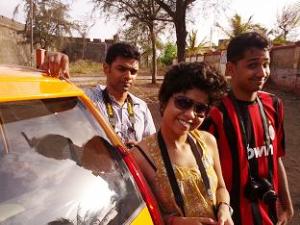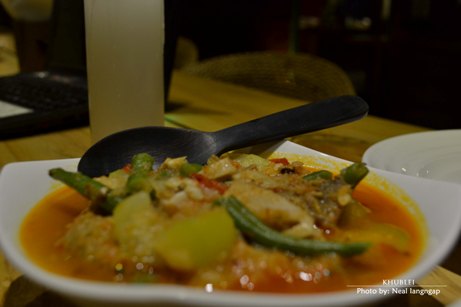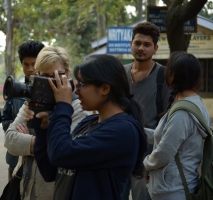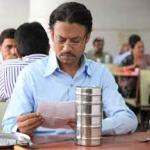Since that gory night of a gangrape in a Delhi bus on December 16. We, The Women of India have been getting unsolicited advice, as usual, for free.
First, the kind I have been hearing for years: Adventurous women ask for trouble.
Women dressed in European attire entice men to rape them.
Just because India achieved freedom at midnight does not mean that women can venture out after dark.
Women should ensure that they do not board buses with few passengers.
But soon enough, the advice turned into advisory: Beautiful women, sundar sundar mahila cannot protest, nor can those who have ever visited a discotheque. Neither can those who are not students. Why at all? When they don’t look like students?
Then came reassurance. Rapes happen only in India. Not in Bharat.
(You thought you lived in one single country? Haven’t you applied for dual citizenship yet?)
And then, the mother of all tips to avoid rape. By a man who is ‘father’ to millions of his devotees: Bapu. Asaram Bapu. The godman from Gujarat came out with a prescription so simple you wondered why no one in the history of mankind thought of it before. Countless women the world over would just have to do what he said, and the ghastly rape rates of the entire planet would be wiped at once: Beg the rapist to leave you. Cringe. Fall at his feet. And – call him brother.
Like me, did the thought of turning a disgusting repugnant perverted creep as one’s brother make you recoil, feel sick, make you want to puke? Did unmentionable words well up in your throat and then you stopped to simply cry for the beloved country that’s run over by jokers?
The joke’s on us. On we the mango people. Dented, painted, more sinned against, most tainted.
Facebook posts, Likes and pokes, notes of anger and anguish all for the girl whose life turned into a cruel joke, whose death a farce. A game of politics played out miles away from her home country just so that her government could buy time to face the millions who mourned her, as many men as women who had no idea what she looked like, what person she was like until that night when six men decided to snuff out her right to dignity, indeed her right to life.
Nirbhaya alias Damini alias Jagruti did get back her name briefly, thanks to a foreign magazine that dared to publish her father’s words of anguish. A simple porter at the Delhi airport who now finds the Capital a huge cross to bear, his beloved daughter gone. To six mad dogs in one night.
Iam too tired to even put the apostrophes to the quotes I have used above, statements made by the worthies who rule us, who we elected to power and who we endure hopelessly, shamelessly. Television channels have ad nauseum reported on these ‘breaking news’ (shattering news, would be more descriptive), live telecasts from India gate and candlelight vigil places have relayed soundbytes of young girls, concerned fathers, disgusted young men; analysis columns in dailies have dwelt on whether or not rapists should be killed or castrated; status messages are spilling over asking if the six men shouldn’t be sent to Saudi Arabia for ‘best punishment’ just as the Delhi rape victim was hurriedly packed off to Singapore for ‘best treatment’?
As a journalist, I try to make sense of the crime and its coverage, unprecedented by any standards of scale or public impact. My mind goes back to the time when I first dealt with the word in the journalism school of the 90s. “Always use allegedly raped, say rape accused, prime suspect... Until the courts decide, its not for you to judge; yours is to report, not editorialise” - we were cautioned by our seasoned teachers. Lessons I faithfully carried into whichever newsrooms I went on to work in, print, radio or television.
Cut to this month when I found in the Delhi gangrape reportage, those legalese and politically correct terms had been shoved out, adjectives thrown in, often with strong powerful adverbs. The active voice was all, the passive had perished. Yet somehow strangely it seemed justified.
Otherwise-objective journalists were also putting out edgy messages that old profs would have scoffed at. “So forgive me God if for just one day I want those 6 men to be dismembered in public, lynched and beaten to pulp with metal rods,” wrote a dear friend with many ‘Likes’ completely endorsing her choice of punishment for the rapists.
As a journalist who happens to be a woman, the outrage (I tried my best to not use this word since it has been appropriated by national television channels for every cause worth a candlelight vigil, but then I succumbed for want of a better one) was twice over. Even the thought of what the 23-year-old would have undergone that night was enough to send down the shivers and seethe in anger.
A couple of mornings after the Delhi incident, local dailies in Bangalore carried news reports of how Karnataka’s home minister, who also happens to be the transport minister, had carried out surprise inspections to check whether buses plying at night were indeed safe and whether the women travellers felt so. “Oh come on, such an incident would never happen here. Bangalore is not Delhi. Or Bihar,” said a cousin to who I read out that report.
Statistics though proved the cousin’s faith misplaced. Oldtimers might find the ‘rape capital’ tag for Bangalore a tad too exaggerated, but there is proof of increasing sexual assaults in the much-hyped cosmo city. The October gangrape of a 21-year-old student of the prestigious National Law School University on the campus is still not forgotten. BPO employee Pratibha Murthy’s rape and murder by Shivkumar, the driver of the night shift vehicle that was to take her to work, shook the corporate world in 2006 into reviewing security systems for women employees.
Meanwhile, there is no stopping the rape bulletins. Girl raped by neighbour. Three-year-old succumbs to rape injuries. Rapist teacher caught, flogged. Housewife raped at knife-point - Rape reports dismissed as single columns in inside pages are suddenly all over the media. So what’s with the surge in rapes across our cities? Are our men turning rabid rapists? Or are more rape victims coming forward to lodge complaints? Or is the media reporting rapes more than ever before?
The truth lies somewhere in between. What we need though is not a hike in quantity, but a qualitative difference in the way rapes are dealt with, in our system. Whether by the police who are the first post for the victims coming in to report their trauma, or the press that can be a pillar of support, merely by covering it sensitively. In a recent case of a 14-year-old girl who got pregnant after being raped by her father’s junior, some of the local media left little of her identity to imagination, giving details of her locality, her school and her community, just short of printing her home address. The threat she faced and the ordeal the family went through, even relocating to another area of Bangalore, can be a potential deterrent for any rape victim seeking justice.
The mindset of some among the police force is no shocker, especially for anyone who has watched the video of the recent Tehelka expose on police in the Delhi-NCR region. Policemen, across the rank and file, are seen in the tape as part of a sting operation by the magazine’s correspondents, offering wise words on how women “ invite rape”. If it were not for the fact that we are talking about real women going through devastating sexual assault, the tape could have been prescribed as comic relief.
Over three years ago, while reporting for a national tv channel I used to work for, on the victimisation of hijras (eunuchs) in Bangalore, I went to a police station to meet the seniormost officer in-charge of that area. I told him what the hijras had told me about police highhandedness and the sexual abuse they face at police stations. The top cop’s words still make me recoil. “Why are you showing sympathy for these people madam, they are only fit for prostitution or beggary,” he ended after reeling off Kannada quotes and expletives that are unfit for printing here.
And to think that men like him are our custodians. Men like those in the forensic team that speculated on the elasticity of vagina of a student who had alleged gangrape saying it was clear “she had had fun before”. Why only men? Sometimes even women, like this former Karnataka minister who bought the silence of a tribal girl with Rs 20,000 so she did not press charges against the auto driver who had raped her. The reason: The rapist and his friends happened to be crucial votebanks for the lady minister.
Insensitivity is not a gender trait. Rather, flaw. There have been examples of women cops being indifferent and male cops rising to the rescue of those who come seeking their help.
A former colleague from NDTV, Nitin Gokhale writes in his blog on how sensitisation of the entire police force is worth investing in. Nitin quotes S B Agnihotri, an IAS officer, who cites one such example. “Sunita Krishnan, the brave and now famous ‘rape survivor’ from Hyderabad who is currently working for rescue and rehabilitation of trafficked girls, had been part of such training of police personnel. A week after one of her sessions, she received a phone call from a Police Inspector who told her that he had carried out a raid for rescue of some girls in which he followed her instructions to the last detail. When he told her that he found it to be the most rewarding day of his three decades service in Police, Sunita was overwhelmed. She told this writer that it was the biggest certificate that she ever got as a trainer.”
The IAS officer, proposing a woman and children helpdesk for every police station, goes on to say “No society is crime free. But a mature society learns from incidents of this type and sets up anti-dotes...”.
If only I had the power to administer the first ‘antidote’, I would tell both the police and the media to be non-judgmental. I would tell them that they have no right whatsoever to judge a woman, no matter what strata of society she comes from, what she wears, who she is with, or, what she does for a living.
A senior crime reporter in Bangalore told me about the case of Nasru, a notorious criminal in the early 2000s, who had made a habit of abducting ‘live band girls’ (a term used loosely for women employed in night clubs as dancers) and bringing them back 3-4 days later, after forced sex and their possible rape. No girl was willing to lodge a complaint, the police said when asked why he was not nabbed yet. Nasru got bolder, this time raping the wife and sister-in-law of a techie on the bonnet of his car, even forcing him to see the ghastly crime.
A couple of weeks later, Nasru was killed, in what was widely believed to be an ‘encounter death’. Everyone was happy and relieved that the baddie was dead, but clearly, the trauma of the dancing girls was not trauma enough to trigger earlier action against their tormentor?
Find us on facebook: facebook.com/TheThumbPrintMag







































